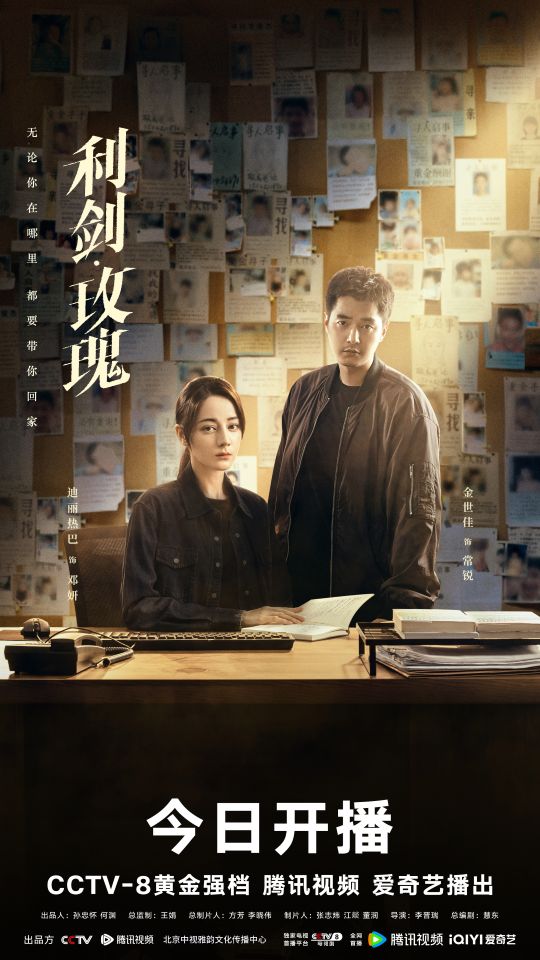
Review: Sword Rose (2025) 利剑玫瑰
Summary: Deng Yan, (ft Dilraba Dilmurat 迪丽热巴), is a recent police transfer to the city. She offers to help walk a young girl home but is kidnapped by human traffickers. Due to her police training, she is able to rescue another captured woman and escape. In doing so, she unintentionally disrupts a sting operation planned by the local Anti-Trafficking Task Force. She is appointed as the new director of the task force. Chang Rui, (ft Jin Shi Jia 金世佳), is a former narcotics officer who specializes in undercover missions. He is skeptical of Deng Yan’s skills as she has had no field experience. Deng Yan immediately throws herself into solving cases and gradually earns the respect of the team. The Anti-Trafficking unit utilizes new ways of thinking and new technologies to solve new and old cases. Through this journey, everyone sees the desperation and anguish of families who have lost loved ones and their resilience to try and bring them home.
Platform: CCTV 8, Tencent, iQiYi
Episodes: 32
Airing Date: July 28, 2025
Final Rating 8/10: A poignant and sincere police drama, led by a strong performance from Dilraba Dilmurat, that sheds an unflinching yet compassionate light on human trafficking in China, revealing both its harrowing toll and the resilience of those affected. The edits required to pass censorship do not detract from the overall viewing experience.
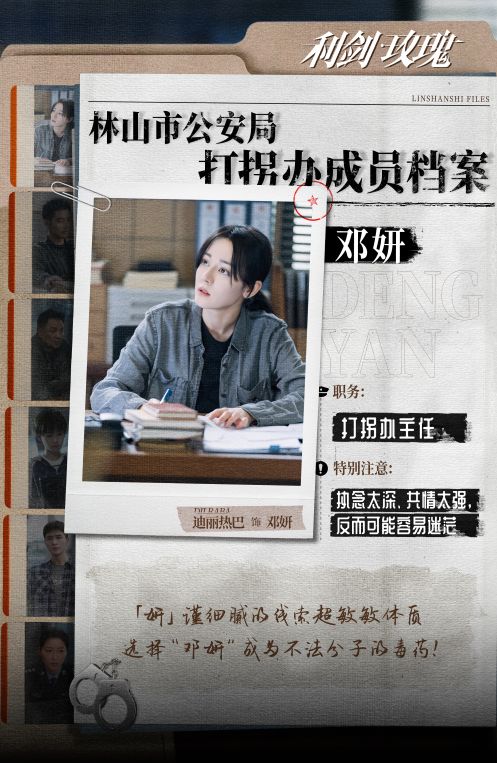
Deng Yan 邓妍 Dilraba Dilmurat 迪丽热巴
New Director of the Anti-Human Trafficking Task Force who has her personal reason for joining the team
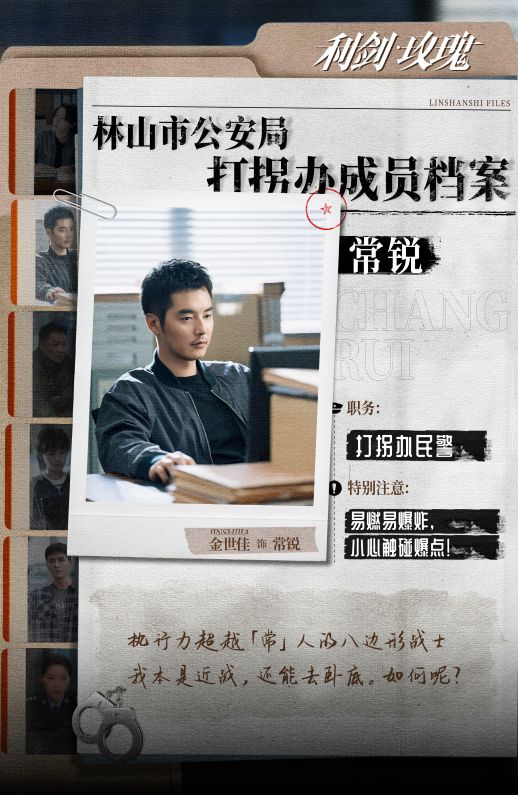
Chang Rui 常锐 Jin Shi Jia 金世佳
Police officer in the Anti-Human Trafficking Task Force who was once in the Narcotics department
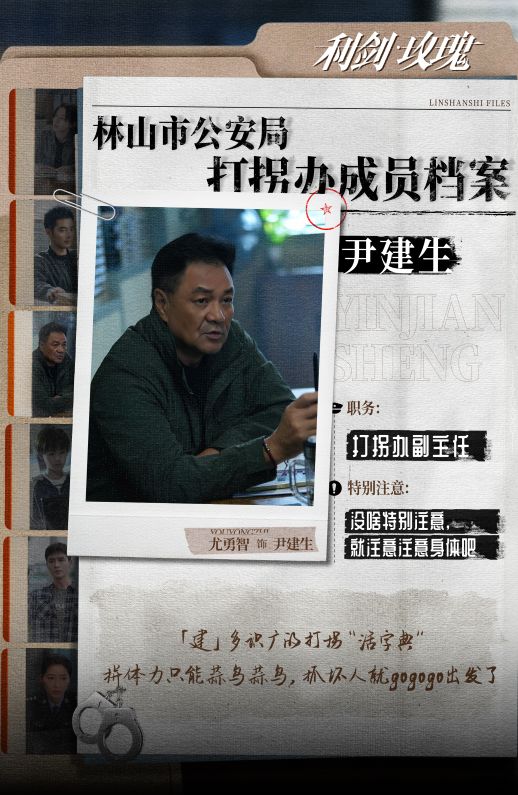
Yin Jian Sheng 尹建生 You Yong Zhi 尤勇智
Deputy Director of the Anti-Human Trafficking Task Force who's been on the force for over 20 years
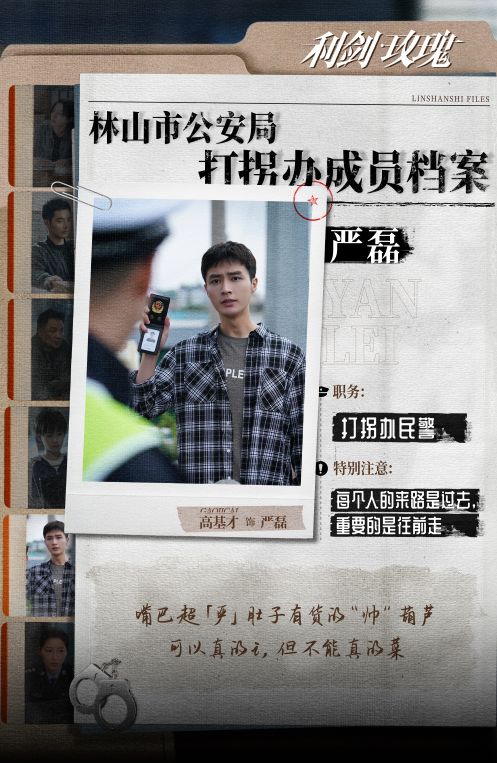
Yan Lei 严磊 Gao Ji Cai 高基才
Police officer in the Anti-Human Trafficking Task Force who's had his own brush with traffickers
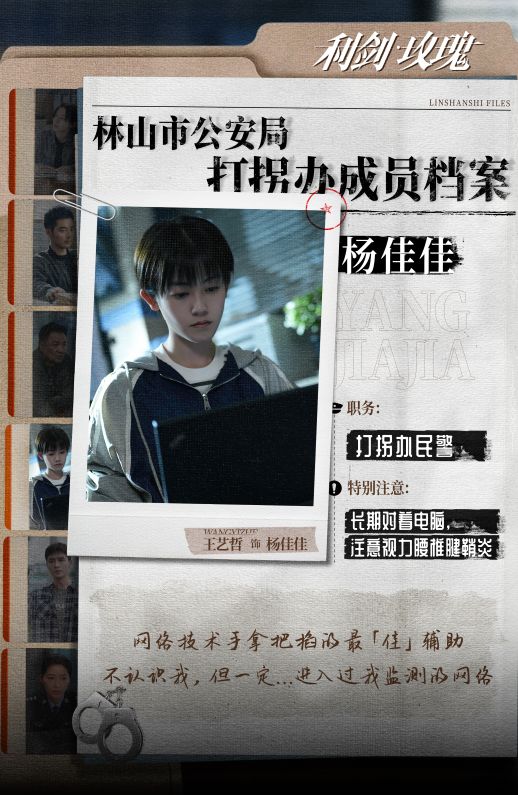
Yang Jia Jia 杨佳佳 Wang Yi Zhe 王艺哲
Police officer in the Anti-Human Trafficking Task Force who specializes in IT
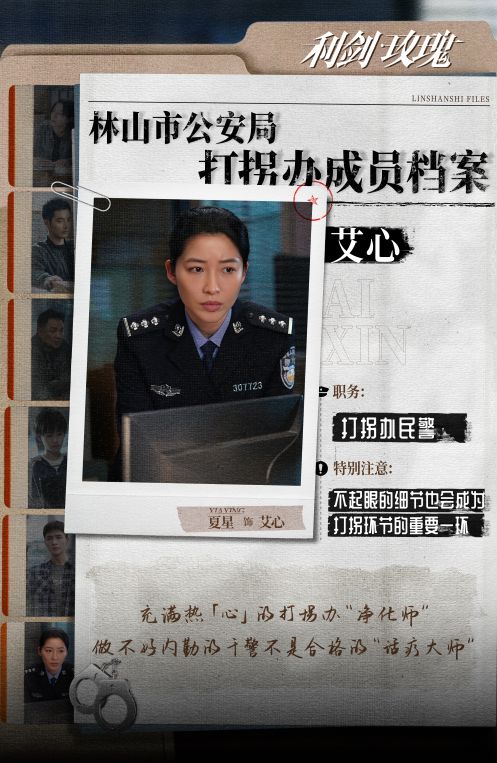
Ai Xin 艾心 Xia Xing 夏星
Police officer in the Anti-Human Trafficking Task Force who is the dependable big sister
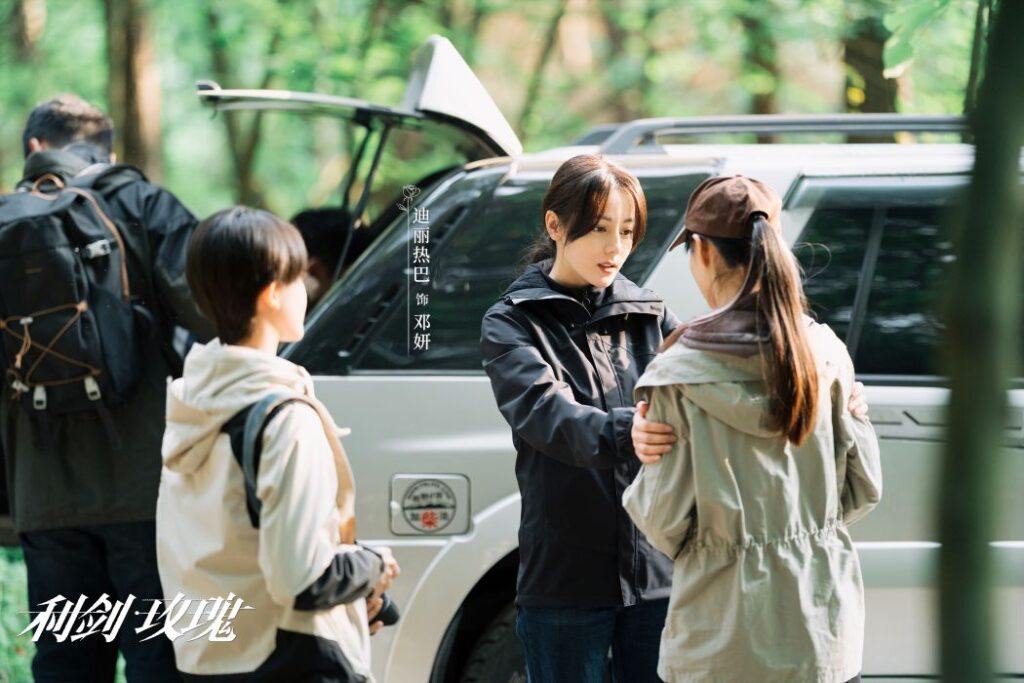
Final Thoughts
This is the first Chinese drama tackling human trafficking to air in over 20 years and it arrives without any of the usual signs of a hit. No famous IP, no big-name director or screenwriter, no marketing blitz. Its only obvious selling point was Dilraba Dilmurat. As her first drama to air in over 2 years, plenty online, even Tencent itself, doubted whether she would have the chops to lead a drama with such a niche topic. She, along with the director, cast, and crew, more than deliver.
Set in 2009, the story follows Deng Yan’s return to Lin City as the new Director of the Anti-Trafficking Task Force. Leading her team against a backdrop of both urgent new cases and decades-old mysteries, she dives into a relentless battle against human traffickers. Dilraba disappears into the role, showcasing marked improvement in her acting and delivering several standout moments. Importantly, the drama gives each cast member, from leads to supporting roles, the opportunity to shine.
Adapted from real-life cases and the stories of real officers, the drama moves from case to case, exposing the greed of traffickers, the twisted motives of buyers, and the devastation left in their wake. It’s refreshing to see police officers actually doing their jobs competently, without absurd plot armor, contrived romance, or petty infighting. It also depicts the necessary bureaucracy with different departments taking over for their respective jurisdictions. At it’s core, the drama is sincere as it tackles this heavy subject. While the storytelling is strong, the show’s heavy edits to pass censorship leave a several awkward transitions. The drama also moves a little too fast, cutting many crucial scenes that left me puzzled.
Despite minimal promotion, the drama became a surprise hit, consistently breaking 2% in ratings on CCTV-8, surpassing 27,000 on Tencent and 8,000 on iQiyi, making it the highest-performing drama distributed to both major platforms this year. This again shows how little faith Tencent had on this drama because typically it would keep the airing rights of its most prized dramas. This drama even outperformed big titles like Yang Yang’s The Immortal Ascension and other period romance dramas such as Wang Xing Yue’s The Wanted Detective. The drama has garnered strong critical reception and has spread by word of mouth with many clamoring for this drama to be submitted for several awards next season. The drama also sparked real-world awareness, inspiring many viewers to help families searching for missing loved ones.
Perhaps the most admirable aspect of this drama to me is Dilraba’s decision to invest her star power in a project with social impact. She spent three months in winter 2022–2023 preparing for the role, staying out of the public eye despite rampant pregnancy rumors and filmed on location in Gui Zhou. At a time when celebrity influence can vanish overnight, she chose to use hers for good, and few A-list actresses can say the same.
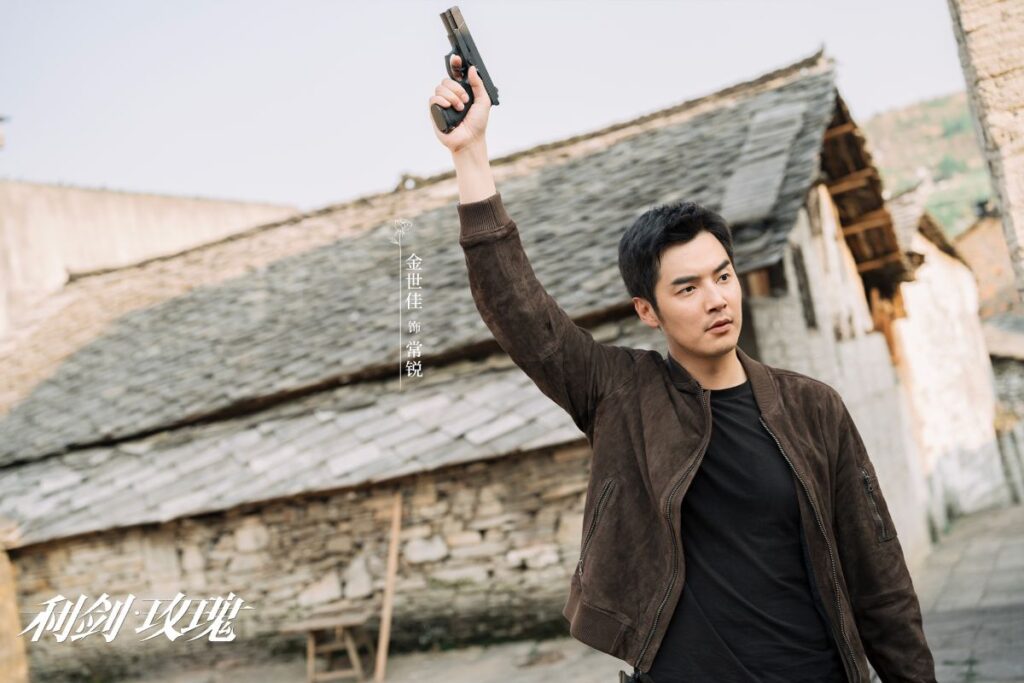
What I Liked
- Not about female strength or male strength, but about human strength: For a drama that is headlined by Dilraba portraying Deng Yan as the director of the team, the drama never pushes a “girl power” agenda. Deng Yan isn’t given special treatment because she’s female. She’s out there solving cases with her team, proving that she’s a capable leader who happens to be female. The show highlights cooperation beyond gender: women support because it’s the right thing to do rather than parroting slogans of “girls help girls”. Men remain integral and active, standing alongside women to defend victims. This balanced, non-antagonistic portrayal between genders feels incredibly refreshing.
- Everyone is their own sword and rose: The title Sword Rose initially seemed to focus on Dilraba’s character, but as the story unfolds, it’s clear everyone carries both strength and vulnerability. The police serve as swords, cutting victims’ chains, while victims themselves wield their own swords to fight for freedom. Families, too, charge forward with their own resolve to save loved ones. Meanwhile, the rose symbolizes hope, resilience, and healing. The police guides victims home. The victims have a thorny determination to fight against oppression. This layered symbolism reflects the intertwined journeys of officers, survivors, and families, each with agency and courage in their own right.
- Professional but Realistic Police Work: The Anti-Trafficking task force operates with competence and dedication, yet the drama never portrays them as superhuman. Instead, success comes through careful investigation, following leads, tracking suspects, applying technology, and community cooperation. Luck does play a role though because in reality, most cases go unsolved. Deng Yan and her team often arrive too late to save victims, which adds emotional weight and authenticity to the story. The show also respects the division of labor among different departments, highlighting their professionalism and teamwork. There was a highly effective scene where one character negotiates with a desperate family member while another anonymous team stands ready with an emergency rescue cushion. We never even see that team, they just appeared to do their job.
- No Redemption for Criminals: A standout choice by the director is the unflinching portrayal of traffickers. The drama shines a spotlight on the cruelty and grotesqueness of perpetrators, refusing to redeem or excuse them despite some having tragic backgrounds. Human trafficking is shown as a crime with no moral justification. It also isn’t one sided, showing only men as perpetrators. Women are just as involved. The show also boldly exposes the demand of those who pay for trafficked women and children. Without demand, there is no market. It was so disappointing, yet realistic that this problem involves men and women across all social strata and education levels.
- There is no happy ending: While the task force rescues many victims and reunites families, the drama does not sugarcoat the deep scars left behind. Time lost, lives forever altered, and lives lost weigh heavily on every reunion and the overall drama itself. There is no universal happy ending. The closing message, “愿天下无拐” (Wish there is no more human trafficking), left me reflecting on this ongoing crisis. The story’s honest and sincere depiction of despair and hope is both moving and sobering.
- Realistic portrayals: Dilraba fully commits to the role of Deng Yan, transforming her appearance through physical training, tanning, and shedding glamor for a realistic police look. She appears with minimal makeup, practical clothes, sneakers(!), and a tired, determined demeanor. The director’s choice to film without filters reveals every wrinkle and imperfection, adding to the drama’s raw authenticity. In early August, Dilraba appeared for a few sponsorship events and everyone found it so jarring to see her all dolled up compared to Deng Yan. Other cast members likewise embrace natural looks and earnest performances, deepening audience immersion. The drama was shot on location in Gui Zhou province which has had a history of human trafficking over the years. The drama depicts the remoteness of villages and just how difficult it is to escape. Unless one is a skilled survivalist, the chances to escape are essentially zero.
- A True Ensemble Drama: Thanks to its many cases, the drama features a large and diverse cast. Every character, no matter how small, is given moments to shine, with many delivering deeply moving performances that brought me to tears. This ensemble approach adds emotional depth and realism. The actors’ commitment has resonated with the Chinese audience, as evidenced by the actors’ active engagement in live streams discussing the show, showing broad appreciation for the heartfelt portrayals across the board.
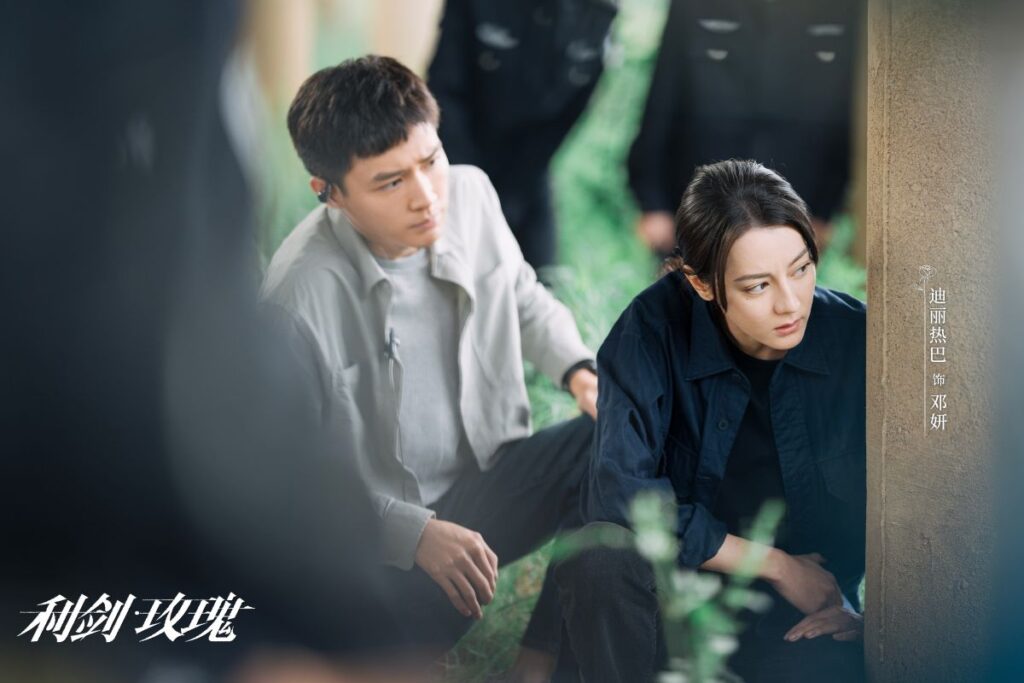
What Didn't Work
- Obvious censorship: The drama spent two years in development before finally landing on CCTV-8. It is heavily speculated that in order to air on CCTV-8, the post production team had to edit several cases. It’s pretty obvious that there was a ton of rework and editing done on this drama because of the lengthy voice dubbing that overlays many scenes. Unfortunately it does detract from the overall viewing experience because the scenes where the voices are dubbed are quite jarring when compared to the live recordings on set. This has also left viewers itching to watch the unedited version of the drama. There’s one particular theory that a certain antagonist is even more deranged than is shown in the drama. This could not pass the censors, triggering of the many changes found in the drama.
- Lengthy interludes at the Noodle Shop: The Reunion Noodle Shop owned by Mrs. Zhang is a focal point for Deng Yan and many characters in search of family members. While Dilraba has some of her best scenes at this noodle shop, some of the interludes at this noodle shop drag the momentum of the drama. It is a convenient plot device when characters come to this location to share clues but it also stretches reality that so many random characters would “happen” on this location to push the plot along. There’s also a few instances when characters simply are informed that their lost ones have been found at the noodle shop but there’s no additional information shown. It left me perplexed as to which cases the drama wanted to show. The drama also kept pushing Mrs. Zhang as the moral compass of the drama. Some of those scenes were really heavy handed and not all for the right reasons.
- Random jumps in cases: In the latter half of the show, the drama speeds through many cases barely showing the rescue process. I guess the drama didn’t want to rehash the same beats but some cases conclude abruptly and move directly on to the next case. The earlier cases had much better resolutions to those stories. It might be due to the forced edits, but several cases left me wanting at least some sort of conclusion.
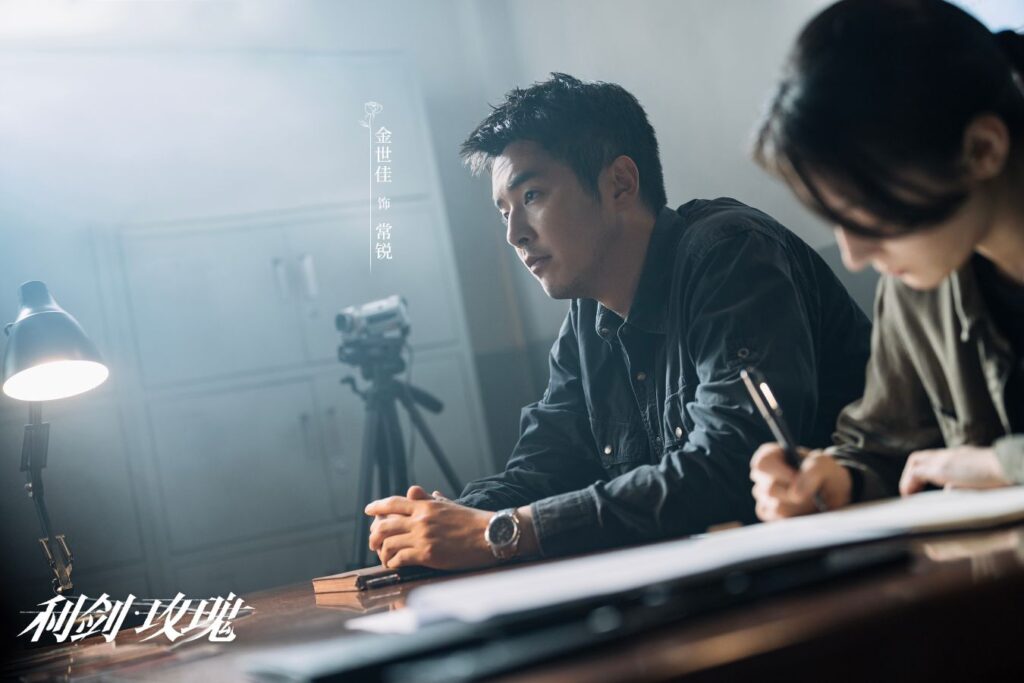
Ending Spoilers
- Mrs. Zhang and Lin Ran: The drama made the bold choice to not show the final reunion between Mrs. Zhang and her daughter. I thought this open ending worked to the drama’s benefit. Lin Ran’s story was told through all the other cases in the drama. With Mrs. Zhang’s Alzheimer’s disease in its advance stages, there would not have been a happy ending between the two. Mrs. Zhang already reunited with Lin Ran in the penultimate episode and the story ends with Deng Yan finally finding her childhood best friend.

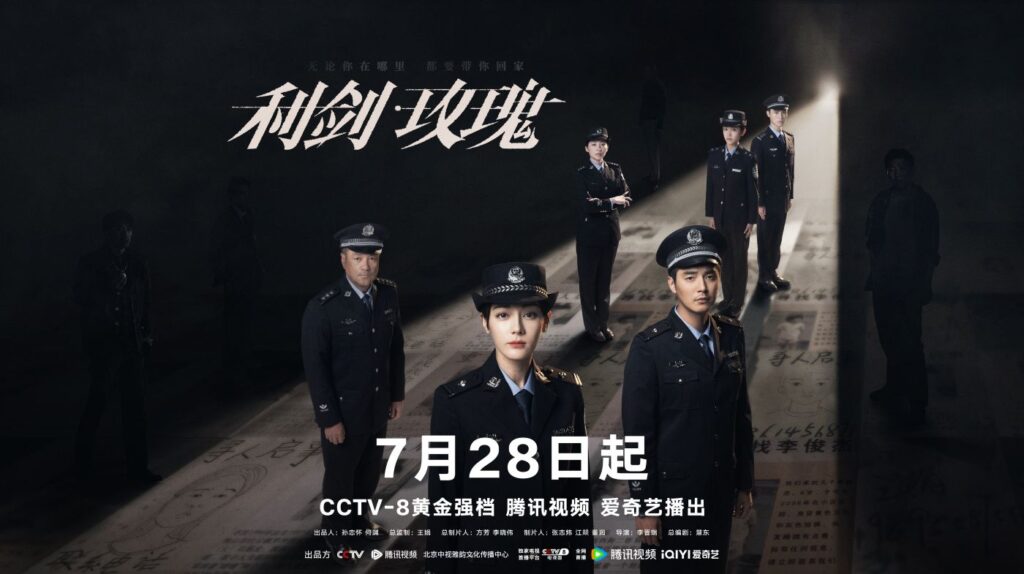
A “girl power” agenda? LOL. C-drama land is full of Gary Stu prototypes who are handsome, intelligent, capable, powerful, cunning, lethal, and whatnot. They are completely perfect and one-dimensional. But I rarely see any criticism of them. Perhaps a “men’s power” agenda? LOL.
I agree that there’s a ton of Gary Stu prototypes that unfortunately dominate the landscape right now. I rarely bother watching those because that favoritism is so lop sided. I’m mainly glad that in this drama, women are able to shine because they are competent and choose the right thing to do independent of the men around them. There’s too many dramas that push “girl power” but in the end the women are completely dependent on men.